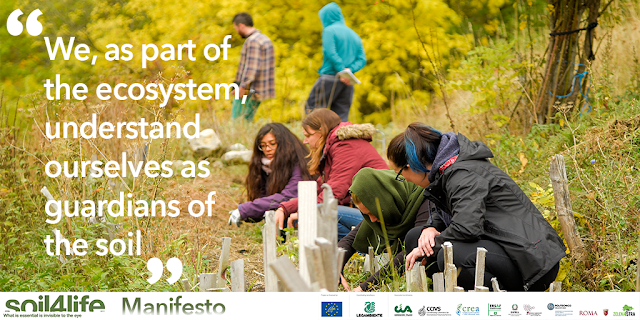We, as part of the ecosystem, understand ourselves as guardians of the soil...
The 5th of December 2019 is International Soil Day, and marked the launch of the Soil4Life Manifesto first draft.
The manifesto begins:
Healthy, living soil is essential for life to thrive. In recent human history quality and care of soil has been largely ignored and misunderstood. The vital role that healthy soils play in our ecosystems needs to be recognised, protected and restored...
We would like to hear and include the voices and concerns of all people affected by this serious and sensitive subject.
The
Soil4Life manifesto was first drafted on October 17th, 2019 during an
international soil management training, as part of the bigger Soil4Life
project and CCIVS for Climate Justice. CCIVS and Legambiente partnered
with other organisations to make this possible and a group of Soil
Ambassadors has been formed. These Soil Ambassadors are taking actions,
from small grassroots, individuals projects to larger partnered NGOs
and university research, to raise awareness, restore degraded soils,
re-green cities, improved farming methods and inspire young people
through education programmes on soil.
At the training,
four temporary, working groups were formed and different concerns and
challenges around soil were discussed. It was decided to focus the
manifesto in relation to 4 of the global SDGs - Zero Hunger, Climate
Action, Life on Land, and Sustainable Cities and Communities.
Since
the first version was drafted, an online document has been created a
participants were invited to add feedback and comments, as the draft has
been developed.
The final manifesto will be delivered to UNESCO in March 2022. It is a call to action by global leaders to support the transition to a life-sustaining, healthy and thriving environment- of which the ground we walk on is the foundation.
You can read more and comment on the manifesto first draft here, your input is greatly valued!


Comments
Post a Comment